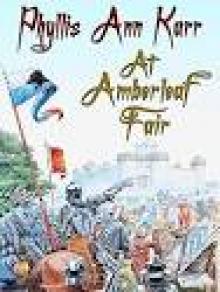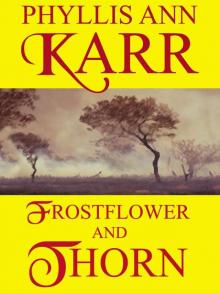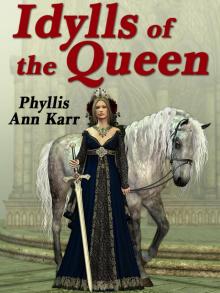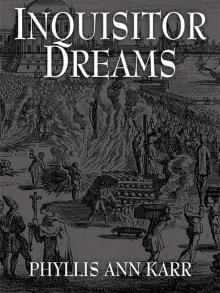- Home
- Phyllis Ann Karr
Inquisitor Dreams Page 11
Inquisitor Dreams Read online
Page 11
“Of course, of course,” the inquisitor replied quietly. “But is it worth our while to press him at this time? We have no evidence that Maestre Micer is other than a faithful son of the Church, and the people’s good will is more important to us in this present crisis than the name of one accomplice in the printing of a document which contains, among many words of value, a single heretical statement.”
They waited. Others came. More came to accuse themselves than to report their neighbors: word must have spread that the Papal Inquisition, as represented in the person of the mild old French Dominican, was indeed lenient and merciful, where the Royal Inquisition was not; and honored its promises, where the new Inquisition did not. Yet not enough came to save the tribunal from long intervals of waiting in idleness. Fear must be abroad that the new Inquisition would win out, after all, and absolutions gained from its predecessor might prove worse than useless, becoming so many hands pointing out whom to prosecute anew.
Perhaps it was this fear which prevented Juan Calamocha from being among those who presented themselves to Fra Guillaume.
At last, after three days of waiting in vain, Don Felipe went himself late on Saturday afternoon to the printer’s shop. He went alone, with only Gubbio to attend him; nor did he name his destination to Fra Guillaume before setting out, saying only that he wished to walk after his hours of sitting. To idle view, he would have seemed merely a stroller with some thought of purchasing a book.
Maestre Micer de Calatayud, apparently less fearful of thieves than of spies, had divided his shop. Stepping in from the street, Don Felipe found himself in a rather narrow room where long shelves held piles of printed books awaiting purchasers and bindings. From an inner room came the sound of voices. Wrapping his churchly dignity closer about him, the priest bade his servant wait for him and penetrated the secrets of the inner room.
He found Maestre Micer showing both apprentices some secret of the mystery of their craft. The master printer looked up at him with a trace of alarm, but said simply, “Your Reverence, welcome to my shop.” Jaime González, also recognizing the bishop’s Ordinary, followed his master’s lead and stood in silent attention.
By the look in the older apprentice’s eyes, like that of some animal captured in a trap, Don Felipe saw that this lad recognized him also. A few moments of returning Juan Calamocha’s gaze, and the priest understood why his name had seemed familiar from the first. The boy of twelve was still visible in the youth of nineteen.
“I wonder,” Don Felipe began, ostensibly addressing Maestre Micer, “if your shop might have on hand any copies of the Divina Commedia of Dante Alighieri of Florence?”
“In which language, your Reverence?”
“The original. I have studied in Rome, and the great Florentine himself abhorred translations.”
“It is unfortunate,” the printer apologized uneasily, “that few of the people for whom I usually print are so blessed. The Comedy was among the first works I printed, it is long ago now, but only in a Castilian rendering. I believe some few copies may still remain, but your Reverence might find it poor stuff.”
“Well, let me read a little and judge for myself. I should think one of your apprentices would be able to find it for me, would he not?”
Jaime González started forward, but his master, showing better comprehension, stopped him with one arm. “Juan, please attend his Reverence.”
Keeping his eyes lowered, the older apprentice wove his way through the workaday clutter surrounding his master’s press and silently accompanied Don Felipe back to the outer room.
Gubbio was hunkered on the floor, idly rolling dice against himself. At Don Felipe’s nod, he touched the dice to his head, returned them to his pouch, and slipped outside to continue his wait.
Still without speaking, Juan Calamocha stooped to one of the lower shelves and fetched up a sheaf of pages, which he presented to Don Felipe, his gaze never rising higher than their hands.
He had found it with little or no trouble, and the pages were already cut. “Have you yourself read this work?” the priest inquired in normal speaking tones.
The younger man nodded.
“How did you find it in comparison with your own vision, Juan de Calamocha?” Don Felipe did not raise his voice. “Or are you still, in the sight of God, properly called Mehmoud Aben Fazoud?”
The apprentice shuddered violently. No doubt he had guessed on Don Felipe’s entrance that the Inquisition remembered him, but hope must have been growing within his soul as long as the Ordinary postponed his move. Don Felipe felt a pang of remorse. He had meant to be tactful, not cruel.
“Sir,” murmured the apprentice, “how…if I were to make you my confession?”
“It is what we have hoped. Come on Monday to Fra Guillaume, and, under the Terms of Grace—”
Juan shook his head. “No—I meant…my Confession. Here. To you. Under the Seal.” He could not have known how his words tore into the priest’s soul.
Yet Don Felipe answered steadily enough, “That, and much else, hangs upon whether you are indeed Juan or still, correctly speaking, Mehmoud. It is of vital importance, young man: Have you or have you not yet received the sacrament of Baptism?”
For a moment—a moment in which Don Felipe seemed to feel his own heart suspend its beating—the apprentice hesitated. Then, at last, he ashamedly shook his head.
The priest released his breath in a long sigh. “Then neither I nor any other Christian priest can hear you in sacramental Confession, for reception of all other sacraments depends upon reception of the first. As God’s loyal servant, I must urge you most vehemently to remember that death may take any of us at any time, and to put off your salvation no longer. But, in a worldly sense, your unbaptized state gives you certain purely legal advantages. The Holy Inquisition does not presume to judge unbaptized souls.”
“You judged me seven years ago,” the youth protested, lifting his head for the first time in a sudden show of courage.
“We judged you, not for writing down your childhood vision, but for giving it to your Christian playfellow. Doing this was in some sense proselytism and rendered you liable to the Inquisition, as you would not otherwise have been. Now, this Contrefuero of yours contains what would be, from a Christian pen, the gravest of heresies; but we find that we cannot call it proselytism, since you do not ask your readers to join with you in denying the Real Presence of Christ in the Most Holy Eucharist, but only in resisting the false Inquisition and certain bloody warfare.”
“I do not deny the Real Presence!”
“Do you deny authorship of the Contrefuero?”
The apprentice stared back into the priest’s eyes. Reading honest surprise, Don Felipe guessed that Juan—or Mehmoud—had let the damning words slip out in the heat of composition, and truly forgotten their presence in the midst of what must seem, to him, his broadsheet’s weightier matters.
He shook his head. “It is mine. I wrote it. I am proud to have written it and tacked it up for our people of Aragon to read.”
“Well, if you should print it again, remember to omit these few words: ‘the wafer that they call.’ It would be best, indeed, to omit any passage dealing with any Christian sacrament. And, while your words about our Holy Child of Daroca are neither false, as far as they go, nor tainted with any heresy, they seem likelier to lose than to win certain Christians over to your stand in these other matters. Also, no matter whose is the guilt before God, it is the secular arm rather than the spiritual which lights the actual fires.”
Looking astonished to find the priest more ally than persecutor, the apprentice nodded.
Belatedly, Felipe remembered another point or two. Late as it was to ask, he went on, “And are you ‘El Santon,’ or is that prophet the man who helped you print your Contrefuero?”
“No, but he is unbaptized, too. And I am El Santon de Aragon. For lack of a better.”
Don Felipe nodded. “Take care, then, that you say nothing which could be understood as
trying to win the Christians among your hearers away from Holy Mother Church herself, and you will be safe enough, at least from the true Inquisition. And, for the sake of our good Fra Guillaume, you might come to us again on Monday and repeat what you have told me.” Should he add that they had deeply regretted the necessity of burning Mehmoud’s little book seven years ago? No, best not lend the youth too much encouragement. “I think,” the priest added, finding the Castilian Commedia still in his hands, “that I will buy this book. I know a binder in Daroca who will clothe it nicely.”
While the apprentice wrapped the pages in clean cloth, Don Felipe returned to the press room to assure Maestre Micer and his second apprentice, with a few words and payment for the book, that as far as the Papal Inquisition was concerned, the matter of El Santon’s Contrefuero was as good as settled, and all in this house could rest easily.
When he came back to the outer room, he found Juan—or, rather, Mehmoud—standing still as a board, his face ashen and his stare fixed. Mutely, he handed over the book in its wrapping. His hands trembled.
“Rest easy in your mind, my friend,” the priest reassured him. “Our ancient Inquisition plays no tricks. I have asked you to present yourself merely in order to settle Fra Guillaume’s mind.”
The apprentice shook his head, but seemed unable to bring forth words.
“Well, then, you need not come at all,” Don Felipe added. “I shall settle his mind myself.” Touching the youth’s shoulder as in fellowship, he took his purchase and stepped into the street.
“Your Loftiness missed a piece of news just now,” his servant greeted him.
“What is that, Gubbio?”
Lounging against the wall, Gubbio dug at his teeth with the ivory pick for which he had spent part of his earliest wages in Don Felipe’s employ. “Fra Guillaume will likely have heard it already,” he went on, speaking around the toothpick. “It seems by the gossip of the street that the crier appeared before his Honor the alcalde’s house scant moments after our setting out for Maestre Micer’s shop.”
“This must be a momentous scrap of news,” Don Felipe observed, “for you to draw out its telling in this manner.”
“I flatter myself that I am no such unmannerly lout as the ruffian who came bawling it out all down this street, so loudly I marvel that you did not hear it with your own consecrated ears.”
“I was with the printer in his inner room just now. We heard nothing,” Don Felipe replied. But, he thought, Juan—El Santon—must have heard; and as he remembered the lad’s expression, cold fear squeezed his heart.
Gubbio carefully put his toothpick away. “Fray Tomás de Torquemada’s new breed must be finding Zaragoza ripe for the harvest. Fray Gaspar Juglar and Maestre Pedro Arbués have announced a second Act of Faith for…let me see…the week after next, on the third day of June. This time they promise a burning or three.”
“My God!” Don Felipe whispered. “Two Acts within a month? …El Santon has shown himself a prophet in truth!”
He turned and went back inside the shop. Mehmoud, or El Santon, or Juan Calamocha, by whatever name God might know him, stood exactly as before. Not even he could have foreseen that his warning, “How much longer before Fray Gaspar and Maestre Pedro light their fires,” could be fulfilled so soon as this.
“Catalonia and Teruel do not stand utterly alone.” Don Felipe spoke not too loudly, but without preamble, and more as if addressing the room itself than its only other occupant. “Valencia too holds out. Since January, the city of Valencia has barred her gates against Fernando’s royal and foreign inquisitors, pointing proudly to her ancient fueros that allow Valencians by birth and them alone to hold office in their native land.”
With a single glance at Mehmoud’s face, to see that his words had impressed their meaning, Don Felipe quit the shop for good.
Within the week, more copies of El Santon’s Contrefuero appeared. This second printing altered not a word as to which arm lit the actual fires; but it omitted all reference to Pyx, Blessed Sacrament or the Holy Child of Daroca, and it added Valencia’s bravery to that of Catalonia and Teruel.
On the third day of June, the royal inquisitors, those creatures of Tomás de Torquemada, relaxed two men and the effigy of one woman to the secular arm for burning. By then hotter fires of the spirit were already ablaze throughout Fernando’s kingdom. And who was to say, Felipe de Alhama de Karnattah mused in his most secret heart, that Gaspar Juglar and Pedro Arbués were themselves less worthy of the stake than were those whom they had sent there?
Chapter 12
The Dream of the Death of Pedro Arbués
He thought at first that he stood in a great, vast cave. Slowly he saw it to be a cathedral. Almost he seemed to know it, yet where one atom of time brought a wisp of near-recognition, the next blew it away again like the smoke of incense before strong wind.
This much was clear: its floors were bare as though swept by that selfsame wind; its columns wide and distant; its arches incredibly high; its vaults lost to sight. Which was perhaps as it should be. A cathedral’s vaults ought to merge with Heaven, ought to touch the seat of God’s infinitude—that same infinitude which the sanctified building and the holy sacraments enacted therein funneled down into humanity. But here and now, in the starkness of this night, those high vaults might as well have touched blank emptiness, draining desolation rather than grace down from above.
Had not God rained fire and brimstone down upon Sodom and Gomorrah? And yet were not brimstone and fire the proper adjuncts, not of Heaven, but of Hell? But this place was cold, its stones colder than winter, its air colder than lonely death.
How, Felipe began to wonder, could he see as much as he saw? It was surely moonless night, for not even the windows themselves, which ought to be stained glass—pale faces of saints clothed in rich colors—could be seen anywhere beyond the columns; and the votive candles created only little caverns of light that illuminated nothing beyond their own stands, making all the rest seem darker yet.
He became aware of a sound high overhead, faint at first…how long it might have been going on before he first noticed it, he had no idea…but then suddenly enlarging, approaching, rushing over him with a roar that winked the candles out. A crash resounded from far in front of him, causing the whole structure to shake. Then, silence.
“Great-grandfather,” a woman’s voice said out of the silence.
He turned and saw her standing beside a column, her trousers and short tunic almost the color of the stone. “Rosemary,” he acknowledged. “What place is this?”
“Some people might call it Plato’s Cave.”
“What sound was that a moment ago?”
For answer, she stepped forward and lifted her right hand, which held a long tube of metal with a knob on one end. He supposed it to be some sleek kind of mace, though the way she bore it implied no threat. But it was no mace. It was a strange, flameless torch, as he saw when she caused the swollen end to send a beam of white light forth to the far end of the aisle.
On the dais where the high altar should have been, a statue stood instead: a Virgin Mary of the Pillar, wielding her rosary like a whip.
Rosemary led the way forward. Don Felipe followed close at her side. The cold beam of her torchlight shortened with their progress, closing in on the dais.
Across its steps, at the feet of the Virgin, sprawled a dark bundle. Step by step, as Felipe approached, he saw it to be a corpse. Streams of blood ebbed from it over the stones; splotches of blood bespattered the statue’s carven skirts. The head of the corpse lay at a painful angle, its neck half severed, eyes staring in blank surprise beneath the edge of a steel cap.
“Who is it?” whispered the priest. “The English bishop Thomas Becket?”
Shaking her head, she pointed her light at a few links of chain mail showing beneath the edge of the murdered man’s vestment. “We’re in the cathedral of Zaragoza.”
“Zaragoza? But—”
“It doesn’t always look
like this. We’re seeing its spiritual truth right now.”
“Then this man is…” Don Felipe tried to study the dead face, distorted and bloodsmeared in the murk of the ghostly cathedral. “Not their Majesties’ new inquisitor from Castile?”
Rosemary nodded. “San Pedro Arbués. Rome gets around to canonizing him in 1867, but the Church never acts especially proud of him outside of Spain. Not like Becket.”
“My God! Who assassinated—martyred him?”
“A few desperate Jews and judaizers.”
“No! Ah, no! Poor fools! Why make such a move as this?”
“Had their backs up against a wall full of nails,” the woman replied, quietly grim.
Don Felipe looked from her face to the Virgin of the Pillar. He believed he saw a certain resemblance.
“But this will turn the people against them!” he protested. “The last resistance will crumble, and we will have this new Inquisition thrust down our throats even here in proud Aragon, whether we wish it or no. It could not have turned out better for their Majesties if—wait! Is it not more likely that this is the work of the royal court, plotted so deeply that the right hand knew not what the left was doing, disguised so as to cast the unhappy Jews into odium?”
“Lovely thought, grandfather, but history says judaizers killed Arbués. Becket was the one with the good luck to have a king blamed for his martyrdom. If it’s any comfort, at least this time they hit directly at one of their enemies. Another five centuries, and people who get desperate enough for justice are going to murder anyone they find handy.”
Her words made still less sense than this martyrdom of the inquisitor from Castile. Could they not have seen that to kill Maestre Pedro Arbués was but to lop off one of the hydra’s heads so that nine more would grow in its place? Looking again at the corpse, Felipe saw new miters springing already, like the tiny caps of new mushrooms, from the stones watered by the martyr’s blood.
“But wait!” he cried. “When is this to happen?”
“Even as you watched,” the woman answered sadly, her voice so much more gentle that he jerked his head round to look at her again.

 The Gallows in the Greenwood
The Gallows in the Greenwood At Amberleaf Fair
At Amberleaf Fair Frostflower and Thorn
Frostflower and Thorn The Fanciers & Realizers MEGAPACK
The Fanciers & Realizers MEGAPACK All But a Pleasure
All But a Pleasure The Idylls of the Queen
The Idylls of the Queen Frostflower and Windbourne (Frostflower & Thorn)
Frostflower and Windbourne (Frostflower & Thorn) Inquisitor Dreams
Inquisitor Dreams